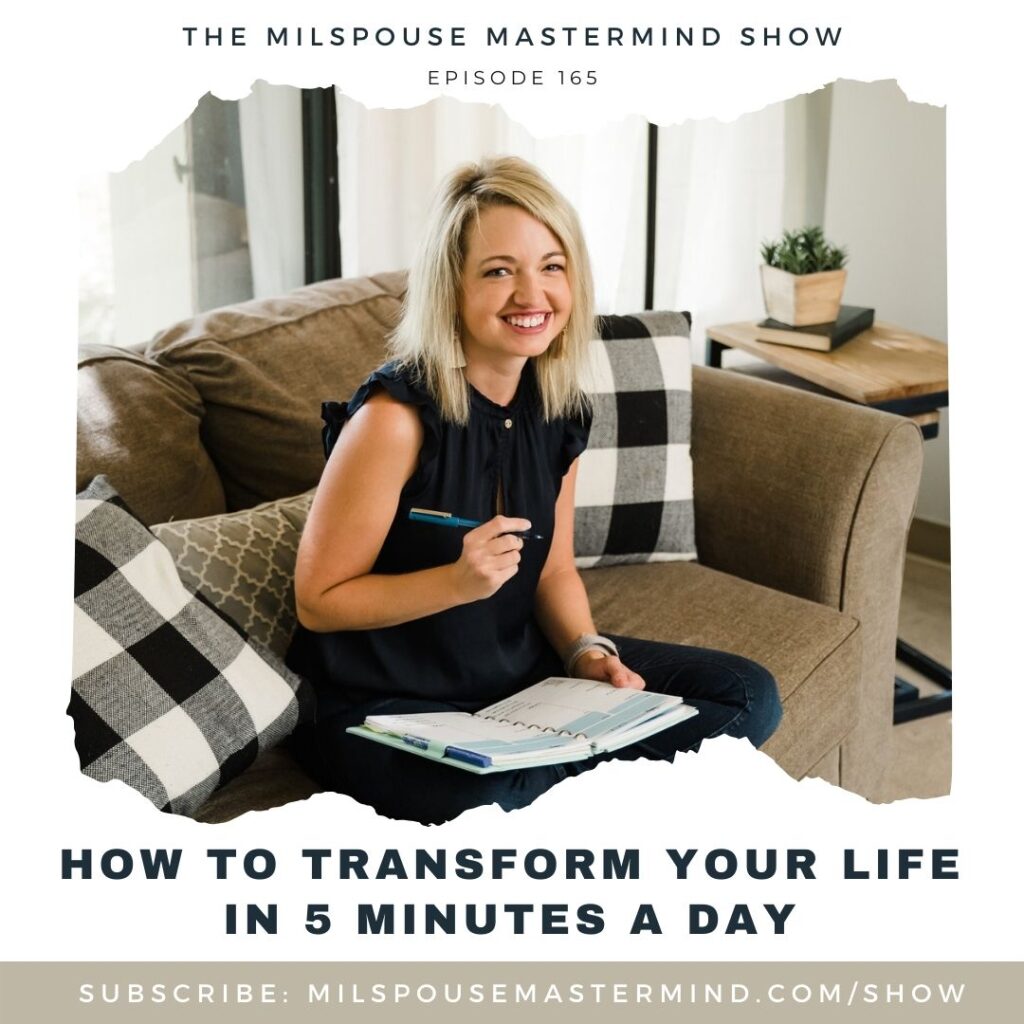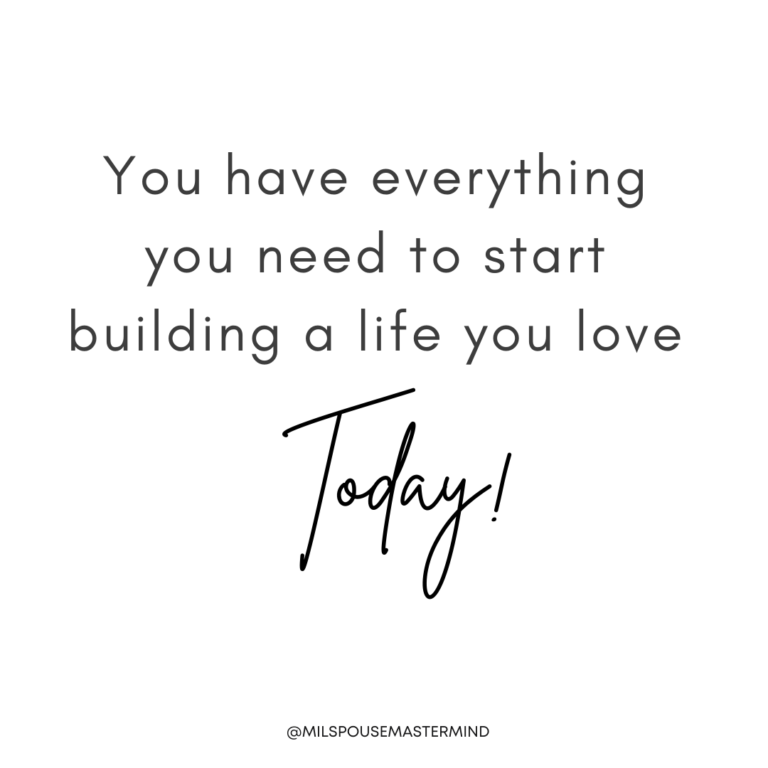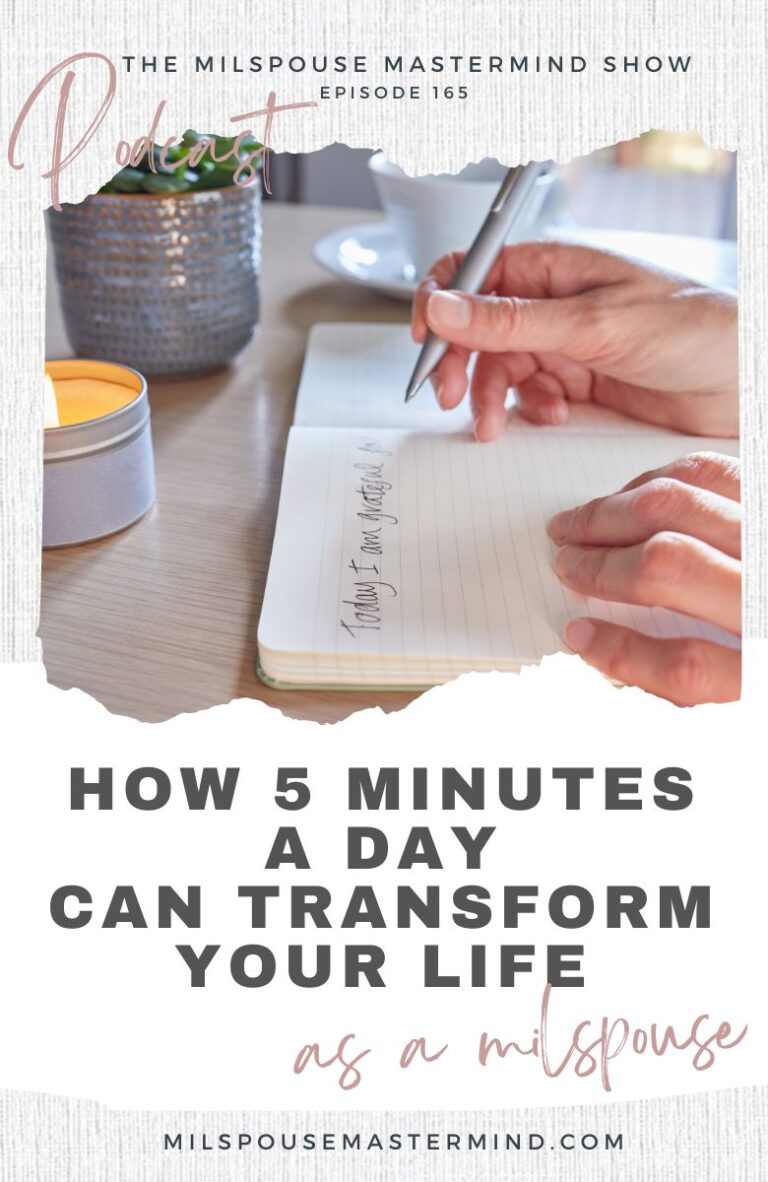
Six years ago I felt stuck in a life I didn’t choose. I was tired of moving and starting over every year or so. I felt pulled in all directions. I didn’t love how I was showing up for my husband or my kids. I just desperately wanted to feel in control of my life and the direction it was headed.
Six years ago I started a daily practice that has transformed my life. No, it didn’t solve all my problems. But it did transform my outlook and the way I look at life. It impacted my relationships. It helped my mindset. It built resiliency. And it led me to do what I do today. I want that same transformation for you.
So today I’m sharing this simple practice so you too can start building your resiliency toolkit and transforming your life in under five minutes a day.

Start Here- Self Assessment: https://milspousemastermind.com/growthwheel
Clarity Workshop: https://milspousemastermind.com/workshop
Join the Community: https://milspousemastermind.com/community
What Matters Most Worksheet: https://milspousemastermind.com/values
Discover Purpose Course: https://morethanamilspouse.com
Leave a Show Review: https://milspousemastermind.com/show
Work With Me: milspousemastermind.com/unstuck

[00:00:00] Christine: Hey, friend. What if I told you there was one thing you could do today to transform your life? One thing that could help you focus, be more creative, build positive emotions, and help you cope with daily hassles and stress. One thing that could improve your relationships, help you move forward after stressful events.
[00:00:29] One thing that would help you be more resilient and thrive as a military spouse? Would you want to know what that one thing is? Absolutely good news for you. This one thing is super easy to implement and it has literally transformed my life, and I know it can do the same for you. So let’s dive into the show and find out what this is and how you can start implementing this in your life today.
[00:01:51] All right, friends. Today on the show we are doing something that I have never done yet in two and a half years of podcasting. But two weeks ago on the show, we were talking about resilience. I will link that episode below. One of the things I said is, if you have not begun to build a resilient, Toolkit, those skills, those tools that you can rely on when you face difficult situations.
[00:02:19] Then I want to help get you started, and this is the place where I think that we all need to begin. It’s from this place of gratitude. So, We are doing something that I have not yet done and that is re-air an early episode from the show. It is probably one of the most downloaded episodes of the show, but I’m going to re-air it for you now because it really focuses on one specific action.
[00:02:52] You can take something that only takes five minutes a day, but that has truly transformed. My life over the last now several years, and I truly believe will transform years. So let’s head back into the archives and hear about the number one place to start when it comes to building your resilience toolkit.
[00:03:15] Today I wanna talk about this one simple practice that literally transformed my life, and can transform yours as well. It’s probably one of the most practical things you can do, and it’s going to do amazing things for you and for your outlook on life. What we’re talking about today is starting a gratitude practice.
[00:03:38] This is something that I started almost four years ago now, and I can’t say enough good things about what it’s done for me, for my family, for my relationship, for how I look at life as a whole. So what in the world is a gratitude practice? In my opinion, gratitude or thankfulness is simply this act of taking time to reflect on and be thankful for the good things in our life.
[00:04:05] So often we just kind of get stuck in a rutt and we take so many things for granted instead of stopping to appreciate what we have and be thankful for it. It’s this sense of appreciation for life. And it matters because when we look for the good, it helps us take our eyes off of what went wrong and focus on what went right.
[00:04:35] For so many years, I was a glass half empty person. I like to think about how something can be improved, but the flip side of that is that. It means I easily see what’s wrong with the situation because I want to know how it can be improved. The problem is when I get stressed, when I am under additional stress, then I go to that negative place, or I did until a friend pointed out to me, when you’re stressed, nobody wants to be around you.
[00:05:09] And I was like, oh, this is a problem. What can I do about it? And so about four years ago, I started this practice of waking up every morning and writing down three things that I am thankful for. It can be big or little, and sometimes it’s really easy to think of, oh, this went right, this went right, this went right, right.
[00:05:31] Other days it’s really challenging because my mind is in that negative space of I don’t love this. I don’t, I’m not. Enjoying the way my life looks right now, and I have to be way more intentional about, okay, what can I appreciate about my life today? What happened in the last 24 hours that I can appreciate?
[00:05:58] And over the last four years, I have watched how my emotions and my outlook on life has completely changed. I’m able to focus way more on what I love about a situation instead of all of the challenges that a situation brings. In fact, recently I took one of these free strength tests where it lists in order 22 of your top.
[00:06:25] Strengths and the number one strength on my list was gratitude. And I will say that all goes back to the fact that for the last four years I’ve been waking up and saying, what three things can I be thankful for today? There are occasions where it’s. Easy because something big happened. We got a family vacation, or my husband got a promotion at work.
[00:06:50] But more often than not, it’s just noticing the small things about life. It’s that hot cup of coffee in the morning. It’s sitting outside and seeing a sunrise or a sunset. It’s a positive interaction with my kids. It’s having a roof over my head. It’s the fact that for once my kids slept through the night, it’s celebrating all of the small things and appreciating the small details of daily life.
[00:07:24] I, around the time that I started this practice, I read a thousand gifts. By Ann Voskamp, which does a great job of kind of laying out what it looks like to start appreciating these small aspects of daily life. I didn’t love her writing style. It’s not for me, but it is a very helpful book and really getting to understand how to appreciate.
[00:07:50] The way the sunlight hits a towel in the morning, whatever it is, for you to start focusing on those little things and enjoying it. If I can sit on my back patio and get a nice, gentle breeze, that is a huge thing that I am thankful for because the sun is hot. It’s always humid, but you know, having that shade and that breeze and getting to look out at palm trees, just brings life and joy to my soul.
So as we engage and focus our attention on what it is that lights us up, we begin to shift our mindset. We start focusing on positive emotions. And when our brains focus on positive emotions, it does so much for us, for our, for our mental and emotional health. Positive emotions are the fuel.
[00:08:48] For resilience, they help us find meaning in our daily experiences. They help us counteract the negativity bias. They help us focus our attention on the good things. They help us perform better. They help us discover new skills. This daily practice of gratitude helps us. Deal with the daily stressors in our life.
[00:09:14] It helps us deal with both the small things and the major life stressful events like a deployment, like P c S, like starting a new job. Not only that, it helps. Strengthen our relationships with those around us. It helps us adjust and move forward despite obstacles, because the truth is that when we are focused on gratitude and what we are thankful for, it’s not that we have fewer negative emotions, but rather we focus less on the negative emotions and more on the positive ones.
[00:09:54] It helps us rebound quicker. Thus, when we say it helps fuel our resiliency, because the truth is we’re all going to have situations that we don’t love that are gonna have pros to it. There’s gonna be cons to it.
And a lot of it comes back to our perspective on the situation. So for example, I live on a remote island and there are people here who absolutely love living here and there are people.
[00:10:22] Who hated here and cannot wait to leave. The fact of the matter is it goes back to our perspective of the situation. What are we gonna focus on? Am I gonna focus on the fact that getting things at the grocery store, I. Is not reliable. Uh, the store might be out of milk on a given week. They might be out of chicken.
[00:10:41] They might be out of all the fresh produce. The fresh produce might all have mold on it already. I can focus on the fact that the things I want aren’t always available at the grocery store. I can focus on the fact that trying to order things online is never a guarantee. It might show up next week, or it might show up three months from now.
[00:10:59] Who knows, it might not even ship here. When my credit card got stolen earlier this year, it took over a month for them to be able to send me a replacement because it’s just hard to get things to the island. I can focus on the fact that I no longer have the option of doing grocery pickup. I spent three years of my life just ordering groceries online, driving up, picking them up, and not really ever going inside of a grocery store.
[00:11:26] And I loved it, but then we moved here and that doesn’t exist here. I sometimes laugh at the memes on Facebook that say, which of these four could you live without? Whether it’s Target or Starbucks, or Hobby Lobby or Chick-fil-A, and my answer is, well, you can live without all of them because that is my reality.
[00:11:47] So I can focus on the fact of the conveniences that I don’t have. Or I can focus on the fact that I live in one of the most beautiful places in the world. I have an amazing, gorgeous beach. 15 minutes from my house. The water is the perfect lukewarm bath water temperature year round. It’s absolutely gorgeous.
[00:12:10] So much of whether someone loves or hates this assignment just depends on perspective and what you’re focusing on. Here’s the thing. All of us,
according to the science, actually have a natural negativity bias. We are hardwired to focus on negative events and emotions. When we experience a negative emotion, it triggers a response in us.
[00:12:38] Our response to either flight, fight, or freeze. Paying attention to these negative events and danger in our lives helped us. In past cultures to survive our brains process. Negative information more quickly than positive information. But so while we all have a negativity bias and it was designed to help us survive, it doesn’t always.
[00:13:08] Benefit us now. So gratitude and positive emotions can help us counteract this negativity bias. It can transform the way we look at life. It can transform our perspective. It can help us focus on the present and what we can be thankful for it despite our circumstances, because there is always. Always something that we can be thankful for.
[00:13:36] If we choose to look for the good, we will find it. If we choose to look for the bad, we will find it. Whatever you are looking for, you will find it.
So how do we start a gratitude practice? Like I said, for me it was. Sitting down with a piece of paper every morning, the first thing in the morning, and writing down three things that I am thankful for.
[00:14:00] And to be honest, that act of starting my day focused on the positive, literally transformed the rest of the day. The rest of how I view the day began with how I started my day. So by starting the day, looking for the good. The rest of my day flowed out of that. So if I were to ask you in the last 24 hours, what is something that went well?
[00:14:30] Something that you can be thankful for? I. Something that you can just celebrate and enjoy that is positive in your life. What would you say Now, if you want to take this gratitude, practice a step deeper, the next question that you would want to ask yourself is why? Why did this go well? Or why am I thankful for this thing?
[00:14:57] Why is it meaningful? And then think about who else is involved in or contributed to that good thing. So for example, I’m thankful that. Breakfast and coffee was waiting for me at the table this morning. So why was that meaningful to me? Well, I didn’t have to actually get up and make the coffee and make the food.
[00:15:23] It was already prepared for me and really, because I did not have to. Spend the time and energy to make the coffee and make the breakfast. Myself, I had more time for other things. Now, who contributed to this good thing? Well, it was my husband. He made our whole family breakfast and coffee. The kids don’t get coffee.
[00:15:42] It’s just for him and I. But reflecting on that event helps me be thankful, a, that I had this good thing in my life. B, that I am thankful for my husband and what he did to serve our family and for the fact that I had hot coffee. So there’s a lot of elements that as we dig deeper into why we’re thankful for something that we learn more about ourselves and about others.
[00:16:09] It gives me more things that I can tell my spouse that I appreciate him for. So thank you babe, for making breakfast and coffee this morning. I really appreciate it. But going deeper, taking that time to reflect on why you are thankful for something can give you a lot of insight into yourselves and others.
[00:16:31] Now the next question. Do I need to do this every day? Well, to get the benefit of instituting a gratitude practice. No. It is not something you have to do every day. No. It is not something that needs to feel like a chore, and it is not something you necessarily need to spend a ton of time on. But if we want to make gratitude a part of who we are, if we want to make it.
[00:16:59] A regular practice, then it needs to become a habit. And in order for it to become a habit, there has to be something that we do on a regular basis. So if you want to get the full impact of focusing on gratitude, you can sit down with a journal and journal out every morning what it is that you’re grateful for and why.
[00:17:21] But for me, what worked was just taking like the five weekdays. Every week, especially to start with, and then just doing three bullet points of things I am thankful for. And that itself right there made a huge difference. Now, have I done that every day for the last four years? Absolutely not. I have had seasons where I was not as good at starting my morning routine.
[00:17:45] And if you do not have a morning routine, then I’m going to tell you to go listen to episode 22, where I talk about starting a morning routine because your gratitude practice. Can be a part of your morning routine, but I felt like it was important to make this a standalone episode because even if you’re not doing a full morning routine, you should have something to start your day off with an element of gratitude and thankfulness.
[00:18:13] And the more consistent and regular you are about starting this practice, the more it will transform your life, and the more it’ll become a part of who you are and how you view the world around you, the more that you will see that you have, that you can be grateful for. Even when things don’t seem to go according to plan, even when you don’t love something, you can always find a way to be grateful.
[00:18:38] No matter. What season of life you’re in, no matter how many challenging situations you are going through right now, because we all have those difficult seasons of life. But even in the hard, there is always something that we can be grateful for if we will look for the good. So just to kind of sum up what we’ve talked about today, this idea of a gratitude practice of showing up and saying, what am I thankful for?
[00:19:04] It builds our positive emotions. It helps us cope better with stress. It will impact our relationships because when we show up and we are focused on the positive, we are being a light and, and positively impacting those around us. So it helps strengthen and build our relationships. So I would love to know if you currently have a gratitude practice, what it looks like for you.
[00:19:31] And if not, if you decide to try this, let me know. Pop into the Facebook group and tell us what you’re doing. Or send me a DM on Instagram. I would love to hear from you and to be able to support you as you start your gratitude practice.
I hope you enjoyed that walk down memory lane. It just goes to show that the tools, the resources, the topics that we talk about on this show stay relevant to your and my life over, over time.
[00:20:03] If you are looking for a specific topic, all of our past episodes are available on the podcast feed as well as on our website, and there are transcripts for many of the episodes that go. Along with each episode, but if you’re looking for a specific topic, go into the blog on our website and you can do a search for a particular topic.
[00:20:27] The website also has more information about the show, about our free resources and ways that we can work together. I hope that you will take some time this week to go back and listen to some more episodes of the show that you will continue to. Practice gratitude to build that resiliency. I will meet you back here next week. Until then, may you live filled, fueled, and full of joy.

Join the MilSpouse Mastermind Facebook Community!
MILSPOUSE MASTERMIND
Get early access to podcasts, exclusive freebies & practical tips to help you thrive as a military spouse, discover what lights you up, and live a life of purpose.